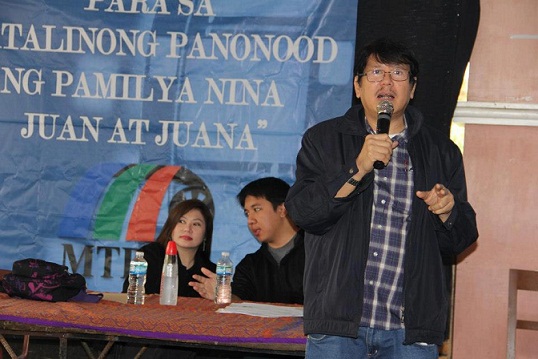
Participants will be parents and other family members including kasambahays. A workshop will be held and the output will be presented to networks and movie and TV producers.
This activity is in line with the pro-active role that the current MTRCB leadership is undertaking. It actually started under the term of now Senator-elect Grace Poe which Chairman Eugenio “Toto” Villareal is continuing.
Villareal, a lawyer, sees the role of MTRCB as not just as regulatory but developmental as well.
“We want to create a culture where contemporary values are upheld and maintained, “ he said.
He said in the discussion among members of the 30-man MTRCB board, they asked themselves, “Why don’t we teach these values and build a culture with these values in media and entertainment so that we lessen if not totally eradicate cases of violations .”
He added that our society should develop a culture “which is promotive of human dignity.”
That summit aims to empower members of the family and kasambahays to understand very well the MTRCB rating system. Like, what’s the difference between R-16 and R-18 classifications for movies? (R-16 – Only viewers 16 years old and above can be admitted while R-18 are only for viewers 18 years old and above.) The restrictions is MTRCB’s way of advising parents and supervising adults that the film may contain themes, language, violence, nudity, sex, horror, and drugs that may not be suitable for children below the specified ages.

In the wake of the controversy caused by the comedy bar jokes of ABS-CBN talent Vice Vulgar with GMA7 broadcast journalist Jessica Soho as subject, MTRCB has started meeting with TV network executives on the migration of comedy bar materials, which are strictly for adults, to television. He stressed the importance of self- regulation by networks.
“MTRCB is always interested for the good of the industry. We wrote ABS-CBN and relayed to them the complaints that we have been receiving. In MTRCB, we teach a child “galangin ang matatanda, huwag apihin ang may kapansanan, don’t embarrass anyone.’ If they are watching this type of (comedy) humor in TV, then there would already be a contradiction, at the very least confusion in the minds of children,” Villareal said.
Related to this, Villareal revealed that up for review in the next few weeks is ABS-CBN’s comedy show “Going Bulilit” as they have received some complaints about “For Adults only” jokes being portrayed by children.
He said, “We have the Best Practices conference last year.They have come up with some solutions. We will now evaluate.”
***
A blogger ,Alsan820, commented on my column last Wednesday , “Does MTRCB have a say on pay-per-view?”
His view: “I think pay-per-view may be considered private and therefore may be beyond the jurisdiction of MTRCB. If a person wants to spend money to view a ‘vulgar show’, that is his or her business.
“However, I believe that money is not the only consideration here, although that is the main goal of ABS-CBN and Vice Vulgar, to make much money from the concert. The vulgar concert went beyond the boundaries of good taste and standards of propriety. Weighed against these standards (and possibly against the Magna Carta of Women), I think this show should be banned for showing for all types of media. ABS-CBN should be faulted for allowing itself to be a party to such vulgarity.
“The network should be ashamed to use the word ‘kapamilya’. Without ABS-CBN and the sponsors (again the source of revenue for the network and the vulgar vice), Vice Vulgar would be relegated to comedy bars, where he rightfully belongs.”
The MTRCB should stay with ratings and classification. It should not regulate artistic expression nor go into the business of developing and dictating cultural values. It must not act as culture police. Let culture grow and develop freely, it cannot be imposed.